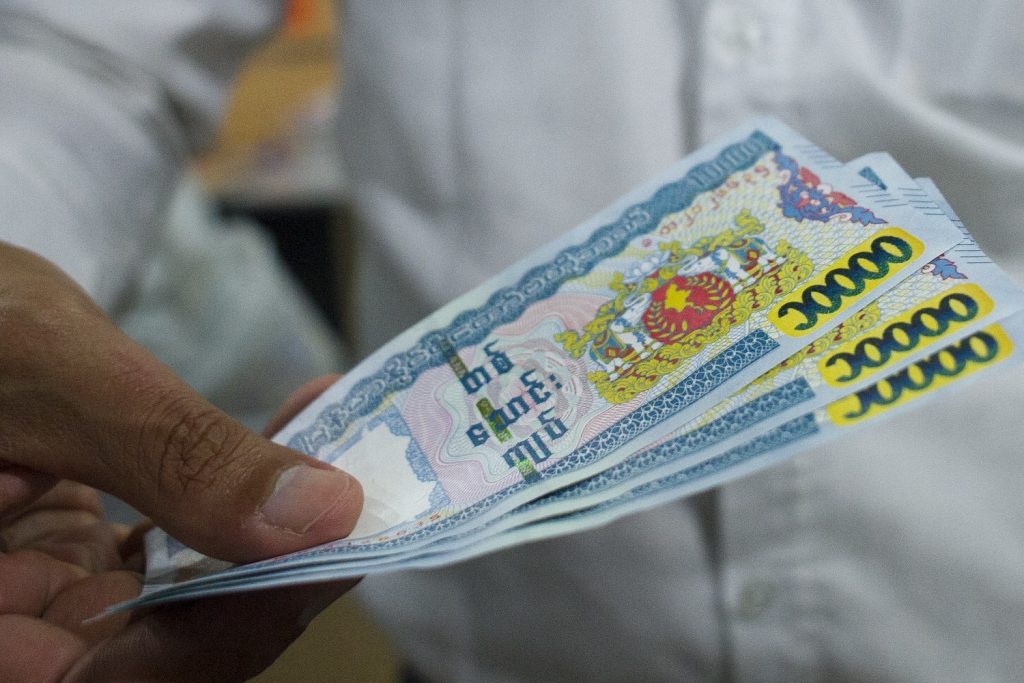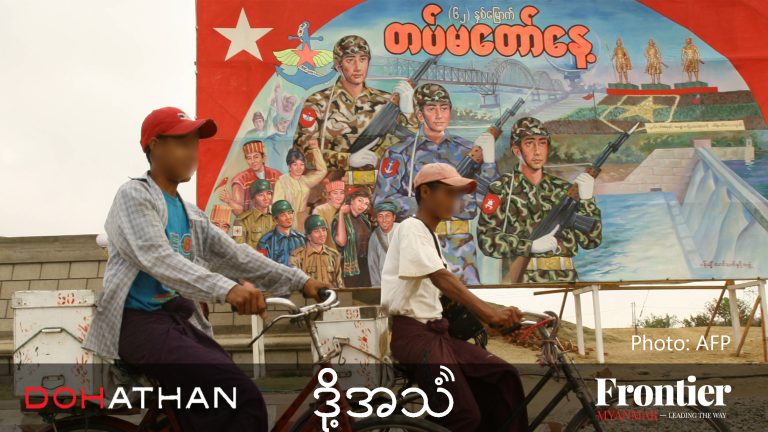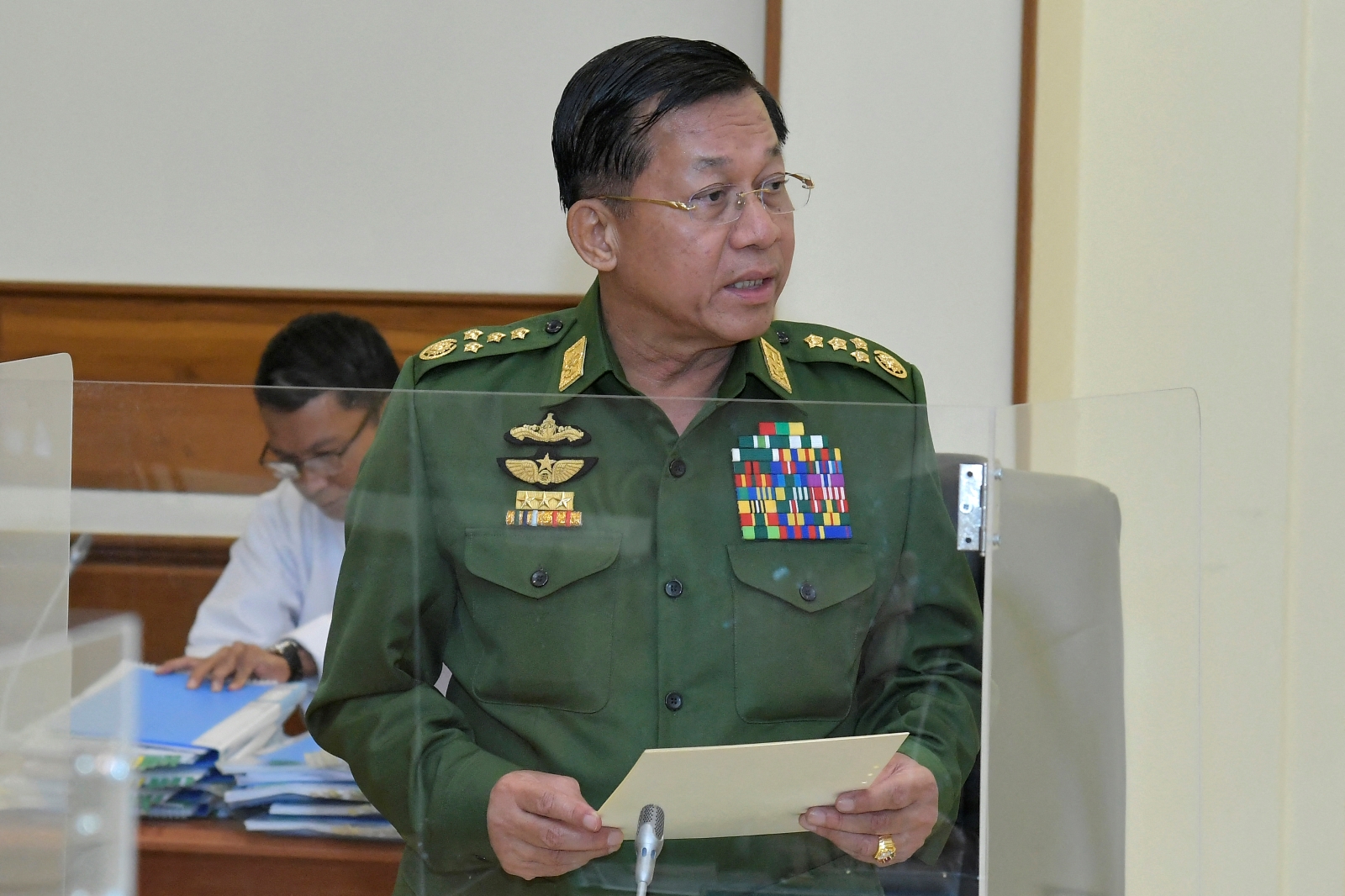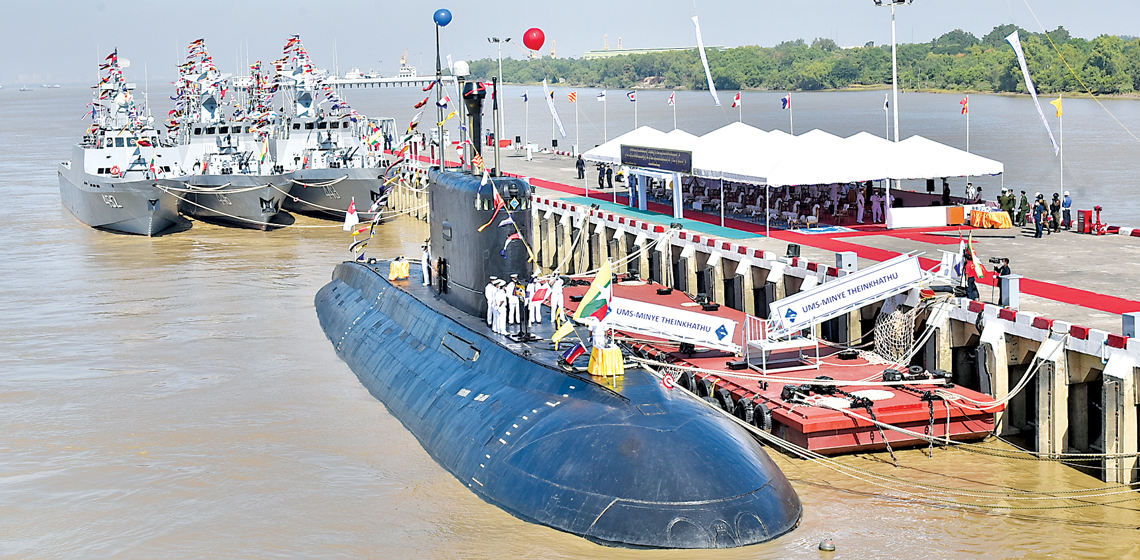While boycotts targeting regime-compliant businesses gain momentum, some Myanmar tycoons and foreign investors are reluctant to burn bridges with the military.
By FRONTIER
Tycoons and business groups regarded as siding with the military government or keeping silent about its abuses have been facing the heat from consumers and employees as boycott campaigns gain momentum.
But despite growing violence against protesters and the wider public, a significant number of foreign and Myanmar companies continue doing business – some under duress and some willingly – which is giving the regime some breathing space.
As long as the junta can rely on tax, export and other revenues, consumer campaigns will struggle to bring it to its knees, yet will increase pressure on the business community to deprive Senior General Min Aung Hlaing of economic control and legitimacy.
Boycotts against military-linked brands have resulted in supermarkets, hotels and grocery shops refusing to stock products such as Myanmar Beer or Red Ruby cigarettes. Defiant consumers have been helped by a mobile app called “Way Way Nay”. Meaning “stay away” in Burmese, Way Way Nay lists brands and companies owned by the military or those seen as cooperating with the regime.
The app also lists state-owned companies, whose revenues now flow to the junta, as well as gemstone businesses run by the family of the junta’s social welfare minister, Daw Thet Thet Khine. Singaporean brands including food outlets Beauty in the Pot and Bread Talk, were also added after comments by the city-state’s government about the need to separate politics from commerce.
The peak industry body, the Union of Myanmar Federation of Chambers of Commerce and Industry, is also feeling the pressure. Its leaders met with Min Aung Hlaing two days after the February 1 coup. Soon after, the chamber denied accusations made on social media that its secretariat had forced employees who had joined the Civil Disobedience Movement, a nationwide strike movement, to return to work. After a public backlash, the UMFCCI temporarily closed its headquarters.
A widely-shared Facebook post called on the public to shame and boycott UMFCCI leaders and their businesses, naming chamber president Zaw Min Win, vice-president U Wai Phyo, who owns the Yathar Cho noodle manufacturer, and U Aye Win, secretary-general and owner of the Thuriya Win and Nagar Pyan tea brands.
Pointing out that those business leaders were summoned by the military regime, other executives emphasised that the attendees likely had little choice but to attend, as they would have faced serious reprisals for snubbing the meeting.
However, some UMFCCI leaders have continued to engage the junta publicly, including Zaw Min Win, who took part in the online 27th ASEAN Economic Ministers Retreat on March 2 alongside U Aung Naing Oo, the junta’s minister for investment and foreign relations.
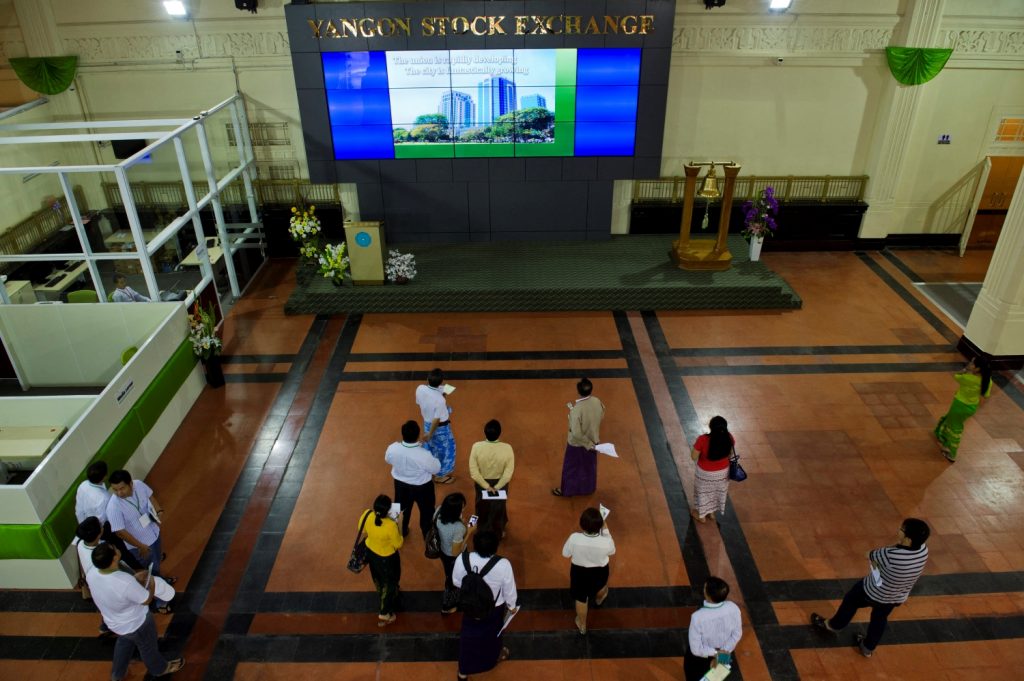
Below the UMFCCI, sector-specific business associations have had to reckon with both angry consumers and the outrage of their own members.
Myanmar Tourism Federation chair U Yan Win, who also chairs the A1 construction company, aroused the ire of many in the industry when, in an internal email on February 5, he told member organisations to avoid politics and focus on reviving tourism.
The email, signed by Yan Win and seen by Frontier, said members “should not criticise the current political situation and should instead prioritise works on the development of [the] tourism sector.”
“Yan Win’s stance is more like ‘we need to focus on business-related matters and shouldn’t upset whoever’s in power’,” a travel agency executive told Frontier. “As early as February 3, people in the travel industry had already denounced MTF’s failure to condemn the coup. The [email] just made the situation worse. Many now regard the organisation as disgusting.”
The backlash was swift. The Myanmar Tour Guides Association quit the federation and several other industry associations boycotted the MTF’s February 10 meeting with the junta-appointed tourism minister, a former general.
Meanwhile, the foreign business community has been divided in its response to the coup along lines of nationality.
European and American business groups have publicly rejected the junta’s invitations to meet. Business sources told Frontier that the Japanese also declined a meeting. However, Gujarat-based Adani Group, whose representative in Myanmar chairs the India-Myanmar Chamber of Commerce, has not moved to withdraw from its deal with the military to build a port in Yangon.
Unlike their Japanese and Western counterparts, the IMCC, China Enterprise Chamber of Commerce in Myanmar and Thai Business Association of Myanmar have not spoken out against the junta’s atrocities, or the disruptions they’ve caused to business operations since February 1.
That approach of staying quiet while trying to ride out the public fury has also been taken by many powerful Myanmar tycoons.
One corporate analyst based in Myanmar said many influential company owners are keeping their heads down because they do not want to burn bridges with a military regime they believe will stick around. “Some companies expect the junta to outlast the current waves of resistance. These big companies control most of the industries, ranging from banking and finance to construction and manufacturing,” the analyst said.
“Commercial chambers, industry bodies, funds and the rest of the corporate community should speak out publicly for human rights, good governance and free flow of information,” added the analyst, because their voices have some influence over parts of the regime.
A tricky position
While many of the business owners who have chosen to stay neutral or collaborate with the regime may be motivated by self-interest – which may prove extremely misguided if the junta falls – the economic and political environment has prompted many to make difficult decisions for the survival of their businesses and the safety of their staff.
Since the military seized power on February 1, anti-coup protests across the country and strikes in government departments and key industries have paralysed the economy and the banking system. The disruption has denied the junta the ability to govern, but also helped push the country towards economic collapse.
Food and fuel prices are rising sharply as supply chains and markets remain disrupted. UN World Food Programme price monitoring in mid-March showed that the prices of essential commodities were rising in some areas, with the retail price of palm oil in Yangon up 20 percent since the coup, and rice prices in Yangon and Mandalay up 4pc since the last week of February. In the Kachin State townships of Bhamo and Putao, the price of rice has risen by between 20pc and 35pc.
“Coming on top of the COVID-19 pandemic, if these price trends continue they will severely undermine the ability of the poorest and most vulnerable to put enough food on the family table,” WFP country director for Myanmar, Mr Stephen Anderson, said in a press statement.
But although business leaders are vexed by the grim macro-economic outlook, as well as the possible effects of international sanctions, their companies and staff face more immediate dangers from the regime itself.
In a bid to restore business-as-usual, the regime has issued threatening ultimatums to businesses, and supermarket and bank employees have been summoned to meetings by the military and ordered to return to work. At the same time, workers have been collateral damage in the junta’s bloody repression of the nationwide uprising; a Myanmar woman who worked in Yangon for South Korea’s Shinhan Bank was killed when soldiers fired on a corporate van taking her home from work on March 31.
Companies who have spoken out against the regime and its abuses have largely opted for safety in numbers, taking joint positions in order to avoid being singled out for punishment by the military.
A statement of concern in mid-February from mostly Western multinationals has since been joined by several domestic conglomerates and small enterprises, as well as some Asian firms.
The statement, facilitated by the independent Myanmar Centre for Responsible Business, said the businesses had “watched with growing and deep concern the developments” since the coup and “hope to see a swift resolution of the current situation based on dialogue and reconciliation in accordance with the will and interests of the people of Myanmar.”
It continued, “As investors, we inhabit a ‘shared space’ with the people of Myanmar, including civil society organisations, in which we all benefit from respect for human rights, democracy and fundamental freedoms – including freedom of expression and association – and the rule of law.”
The statement’s initial signatories included Telenor of Norway, Maersk of Denmark, Carlsberg of Denmark, France’s Total, Australia’s Woodside, ENI of Italy, Coca-Cola of the United States, H&M of Sweden and Nestle of Switzerland, as well as Qatar’s Ooredoo.
These mostly Western firms were later accompanied by Myanmar’s largest private bank, KBZ; City Mart Holding Co Ltd, which runs the country’s biggest supermarket chain; firms led by tycoon U Theim Wai (aka Serge Pun), and Frontier. New signatories from elsewhere in Asia include Japan’s Daizen, an investor in the Thilawa Special Economic Zone in Yangon, Japanese machinery maker Kubota, drugmaker Otsuka Pharmaceutical, also from Japan, and Singapore private equity fund Ascent Capital.
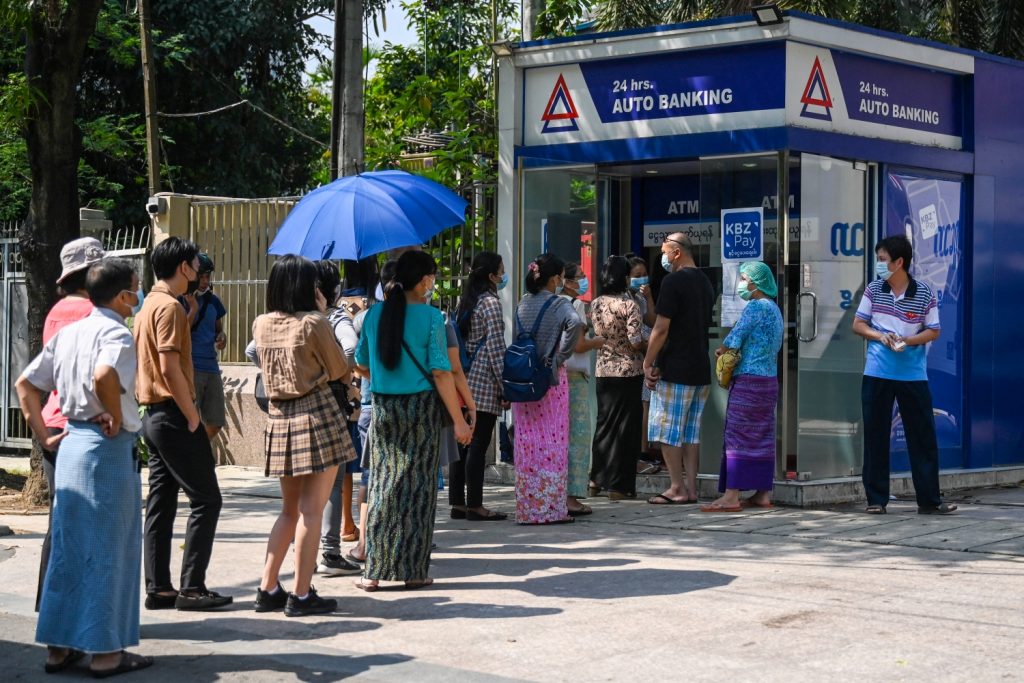
The participation of Japanese companies in the statement reflects a broader unease among the Japanese business community in Myanmar, which normally prefers to keep its concerns private. It also matches a rare degree of condemnation from the Japanese government itself over the Tatmadaw’s actions.
The Japan Chamber of Commerce and Industry in Myanmar issued a statement in mid-March expressing “deep concern over the ongoing violence against Myanmar citizens engaging in peaceful protests, which is causing many casualties”.
“Initially, Japanese businesses wanted to speak out but were hesitant to weigh in so publicly,” a Japanese senior executive involved in the chamber discussions said.
“But the escalation of brutality, particularly in Hlaing Tharyar, as well as the [Japanese] ambassador’s public remarks, prompted companies and the JCCM to react,” he said, referring to the bloody events of March 14, when the security forces killed more than 50 people in Hlaing Tharyar, an industrial suburb of Yangon.
The JCCM statement came amid repeated calls from Western chambers of commerce not only for a halt to killings, but also for a resumption of uninterrupted internet services.
Min Aung Hlaing has not heeded these calls. Two days after the Australian, British, French and New Zealand chambers issued a statement on March 30 complaining that internet disruptions had made business operations “extremely challenging”, the junta moved to shut down all wireless broadband services.
“We all rely on [the] internet, and without it many basic services cannot be provided to millions of Myanmar citizens,” the four chambers said, echoing concerns previously expressed by European and American business groups.
The junta’s desire to control the internet without regard for the people’s rights to free expression and access to information has put telecoms operators and internet service providers in a particularly difficult position. These companies have been ordered to block social media platforms, take down mobile internet services and wireless access, and shut down their entire networks from 1am to 9am each day.
Telenor, which began operating in Myanmar eight years ago under the Union Solidarity and Development Party government, had been disclosing the directives issued by the Ministry of Transport and Communications, which is now controlled by the military, but in mid-February the company said it was “no longer possible to do so”. Nonetheless, it still discloses on its website whether its services are available. The Norwegian telco publicly objected to a punitive draft cybersecurity law released by the junta in February.
Despite the limitations, Telenor’s efforts to speak out and maintain transparency have not gone unnoticed by protesters.
“Telenor has stood up for the Myanmar people and I support them,” said Ko Shwe, a young protester in Yangon. “If the internet service providers and operators can collectively stand up for the people, that’s a huge force against the military regime.”


